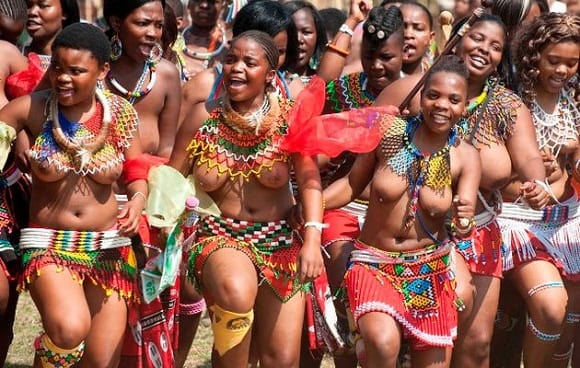There are three constitutional monarchies in all of Africa today, including Morocco, Swaziland, and Lesotho, and only Swaziland is an absolute monarchy. An absolute monarchy is a system of government in which the monarch or sovereign has absolute powers over the people.
Swaziland is a small country in southern Africa with a population of just above 1 million. The people of Swaziland strongly hold on to their traditions, and the country is often remembered in popular culture for its umhlanga ceremony or reed dance (pictured), where bare breasted nubile maidens dance in solidarity for the king.

Under Swazi law and custom, all powers are vested in King Mswati III who rules over his people by decrees and does not have to answer nor seek the approval of parliament for any of his actions.
King Mswati III was crowned king in 1986 at the age of 18, when he returned home from school in England to succeed his father, King Sobhuza II (pictured at left), who died at the age of 82.
King Sobhuza, who had 125 wives and several children during his lifetime, announced the suspension of the constitution and a ban on all political parties in 1973.

King Msawti has, however, restored the nation’s parliament and seems to be content with about 15 wives (so far). And while King Mswati appears to be progressive and receptive to the ideals of human rights for all, Swaziland has actually seen its media and freedom of speech weakened during his reign. In fact, journalists and activists have been targeted with restrictive legislation.
And in contrast to his late-father, King Mswati seems to enjoy an unbridled life of self-indulgence and luxury, with a “legitimate” claim to 60 percent of all of Swaziland’s land.
During his tenure, King Mswati has impoverished his people by institutionalizing corruption with his bare faced abuse of state resources and the granting of industry monopolies to companies in which he has significant interests.
According to the United Nations Children’s Fund, Swaziland has the highest HIV rate in the world, with 26 percent of the population infected.
For its part, the government has generally failed to secure modern, free, and affordable treatments to combat the disease, such as anti-retroviral drugs, for the population. Meanwhile, the economy continues to struggle under fiscal indiscipline and government corruption.
The bulk of Swaziland’s foreign exchange earnings come from the sale of sugar from its vast plantations, remittances from its migrant workers (mostly in South Africa), and the export of textiles to the American market, a market it has recently been locked out of due to its poor human rights record.
However, King Mswati seems hardly troubled at all.
Instead, he has mostly withdrawn into the comfort of a primitive form of autocratic government that leaves many awash with the memories of the half-kleptomaniac, half-deranged rulers of Mobutu Sese Seko of the Congo and Idi Amin Dada of Uganda that were scattered across Africa in the early years after independence.
Some have called for Swaziland to get rid of its traditional system of government, observing that it leaves too much power in the hands of one man.

King Mswati III addresses the united nations
Photo: buzzsouthafrica.com
In theory the absolute monarch exercises total power over the land, yet in practice, the monarch is kept in relative check by equally powerful interests, such as the aristocrats, the clergy, and the military.
While it may not necessarily be the best form of government, an absolute monarchy does have its advantages, such as sparing its citizens from the constant struggle for power that characterizes a republic.
With extensive powers vested in the ruler — free from the shenanigans of political actors — an absolute monarch (benevolent dictator) is in the best position to advocate and implement far-reaching and wide-sweeping progressive changes in his domain, and it has to be said that often the failure of such initiatives is a clear indictment of a ruler who has failed to rise above the narrow-minded tendencies of decadence and avarice.
Absolute monarchies as a form of government continue around the world today. Classic examples include Qatar, and the United Arab Emirates (UAE), with the UAE kingdom of Dubai providing perhaps the best example of how an absolute monarchy can adjust to the changing times while holding on to cherished tradition.
King Mswati is on the brink of squandering a unique chance to show the world that African indigenous institutions and government can provide leadership that meets the challenges of modern society.
It is not clear how much world history the young Mswati learned during his time in London, but if the rumbling voices of dissent from the aggrieved and oppressed in Swaziland continue, he should know that a kingdom like the one he rules over is always one step away from an uprising or revolution.
For now, Mswati is king of Swaziland and he will likely remain one far into the foreseeable future, but the prospects and viability of Africa’s last absolute monarchy will largely depend on the legacy he lives behind.










